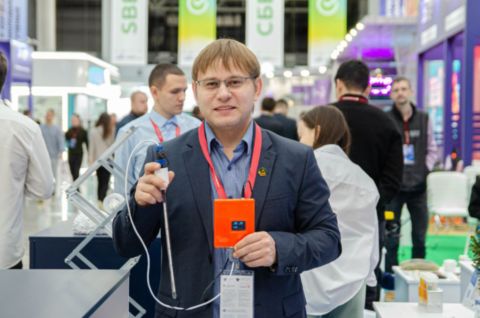South Ural State University has become the winner of a regional grant aimed at creating a new research laboratory. Young scientists, from first-year students to doctors of sciences, will be working there.
The purpose of creating the Electromechanical, Electronic and Electrochemical Systems Laboratory will be developing a set of modern solutions in the field of vehicles with traction electric drive, which includes electromechanical, electronic and electrochemical systems. Vladimir Zhivulin, Associate Professor of the SUSU Department of Materials Science, Physical and Chemical Properties of Materials and Senior Research Fellow of the Crystal Growth Laboratory, has been appointed head of the new research space.
The total amount of funding for the project equalled thirty-six million roubles. The Ministry of Science and Higher Education of the Chelyabinsk Region allocated twenty-two million within the grant, and seven million each were allocated by the university’s industrial partners interested in creating the youth laboratory: Elektromashina Scientific Production Association and Chelyabinsk Zinc Plant.
As part of the youth laboratory, SUSU scientists will develop a set of modern solutions in the field of vehicles with traction electric drive, which includes electromechanical, electronic and electrochemical systems. Here, they will conduct research and development in four areas: 1. development of electromechanical systems, 2. development of electronic control units, 3. development of machine vision systems, 4. development of chemical current sources (Zn-ion batteries). The work of the laboratory should result in autonomous vehicles with traction electric drive, equipped with a machine vision system. Such platforms will be in demand at industrial enterprises in the Chelyabinsk Region and beyond.
The laboratory being created will bring together specialists from such scientific fields as electromechanics, electronics, materials science, physics, computer, engineering and technical sciences. This multidisciplinary approach will allow creating high-tech products.
Nadezhda Kuleva has been appointed head of the division for the creation of electromechanical systems and electronic control units. Under her leadership, the team will develop a new design of a traction electric motor and an electronic control unit. It is important that the electronic control unit will be developed using Russian components.
Vladimir Surin has been appointed head of the division for the creation of machine vision systems. His team will work on creating a machine vision system that will be integrated into the vehicle control system and act as an autopilot. The system will allow transport at an enterprise to move along a predetermined route without human intervention, and in the future, the autopilot will be able to completely "autonomize" a car.
Vladimir Zhivulin has been appointed head of the division for the development of chemical power sources. The team will work on creating a technology for the production of Zn-ion batteries.
The goal of the scientific direction of work is the development of new materials capable of ensuring the efficient operation of a Zn-ion battery (cathode materials, electrolyte, modification of Zn anode). The results of the work in this direction will be scientific articles, conference abstracts, and patents. In their work, the employees of the new laboratory will use, among other things, the equipment of the SUSU Nanotechnology Research and Education Centre for Collective Use.
The next stage will be the development of the technology for assembling and testing Zn-ion batteries. The results of the work in this direction will be the prototypes of individual elements and battery blocks. Some of the necessary equipment has already been purchased with university funds.
“Our grant will wrap up in three years, so by the end of 2027, we are faced with the task of creating a prototype of an autonomous industrial vehicle,” says Vladimir Zhivulin. “By the end of 2025, we should not only open a ready-for-use laboratory, but also recruit a team of young enthusiasts ready to become part of big science by September 1st. By December, we will already have several fundamental studies on the topic of the project conducted and their results published. Our plans for 2026 include the creation of a prototype of a single Zn-ion battery element, as well as technical documentation for the manufacture of a prototype traction electric motor and its control system. By the end of 2027, we will present a Russian prototype of electric transport with an industrial zinc-ion battery, equipped with a control system and technical vision."
Two classrooms have been allocated for the Electromechanical, Electronic and Electrochemical Systems Laboratory at SUSU, where repair work is currently underway according to the project.
Students and young research fellows from the Departments of Materials Science, Physical and Chemical Properties of Materials, Electric Drive, Mechatronics and Electromechanics, as well as students from the Physics and Chemistry Faculties will be invited to work in the university laboratory.




